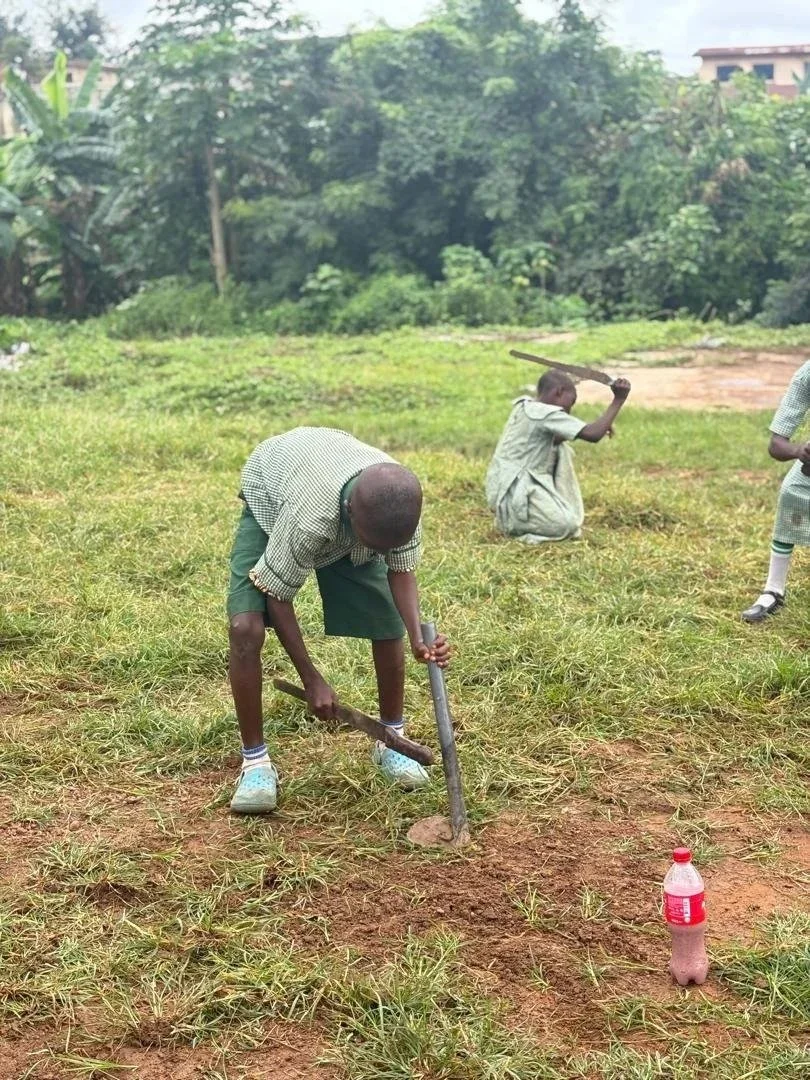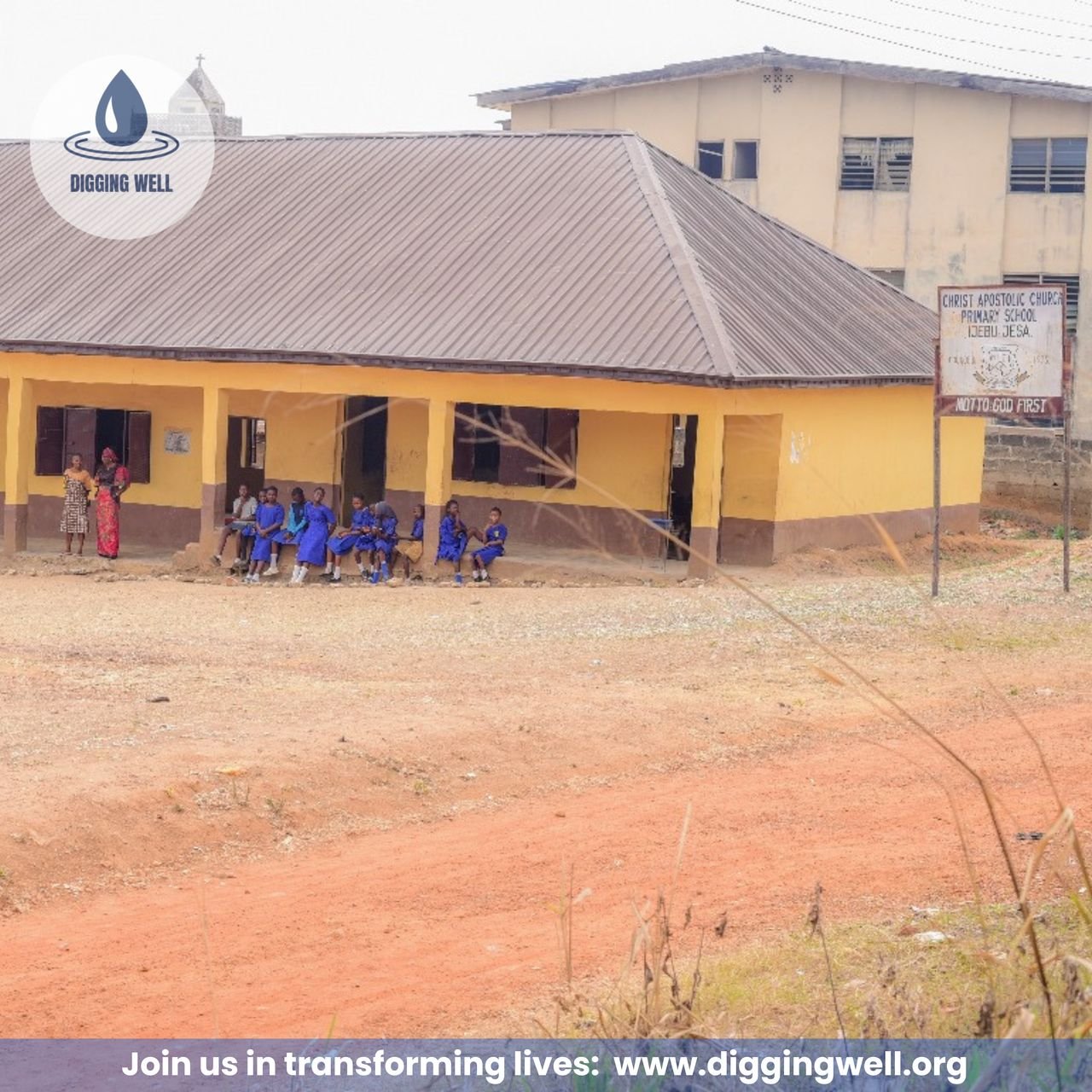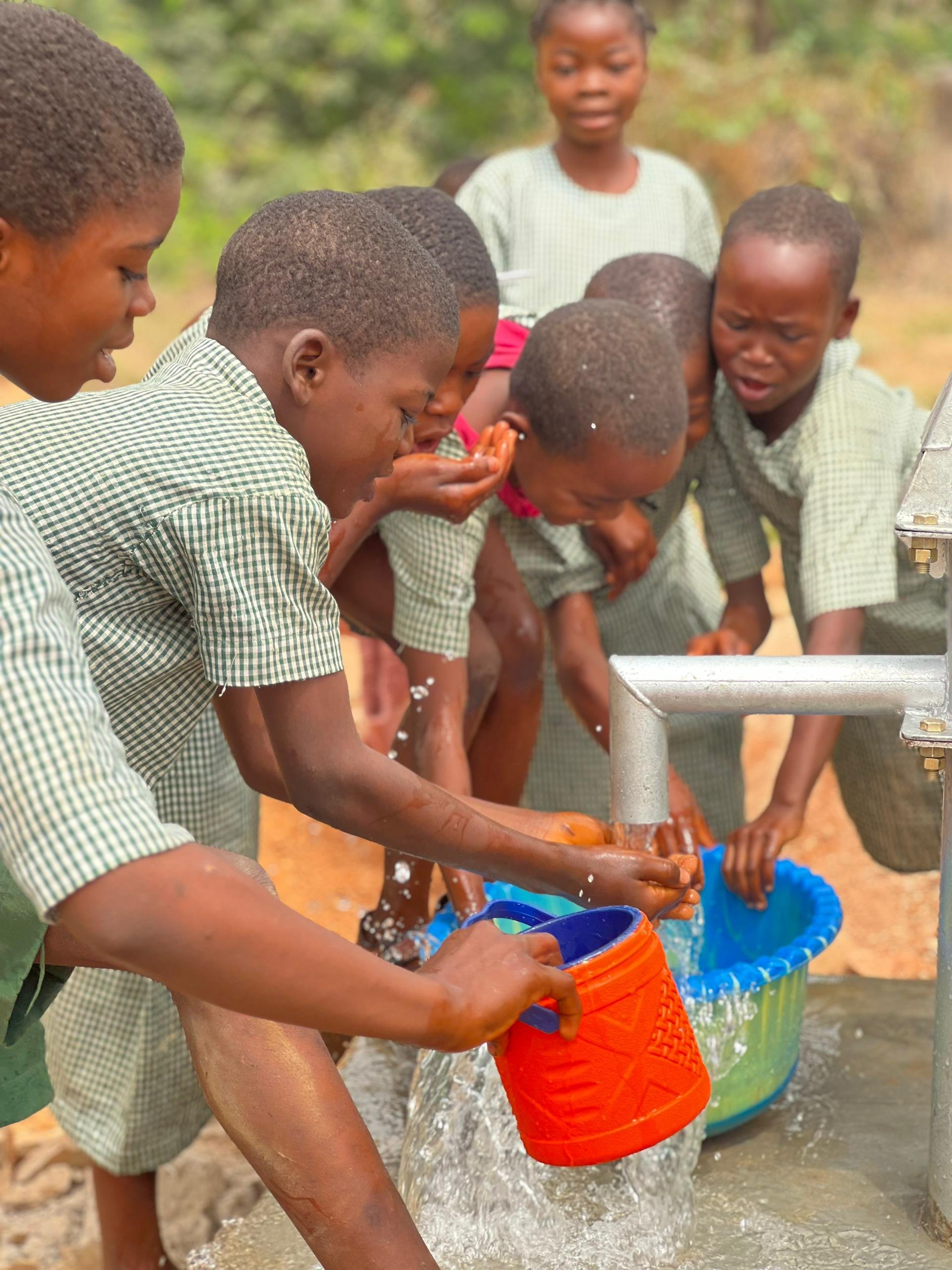
Lessons They Don’t Teach in Class
Picture this: the school bell rings, but instead of opening their books, children grab cutlasses to clear the overgrown grass around the compound. Or think of a classroom where the first lesson of the day isn’t mathematics, but how to wait quietly because the only toilet is broken. These aren’t scheduled subjects, but they are the daily lessons many children learn.
The Hidden Curriculum
Children in under-resourced schools are taught much more than what’s on the chalkboard:
• Endurance: Developing the ability to endure prolonged periods of thirst, recognising that access to drinking water often necessitates a lengthy journey, and acknowledging the lack of restroom facilities following such an endeavour.
• Improvisation: Using torn notebook papers instead of toilet tissue, finding small tricks to cope where systems have failed.
• Resignation: The quiet belief that this is normal, that life doesn’t offer more, and expectations should stay low.
They’re scars in disguise.
More Than Textbooks
The environment teaches as powerfully as any teacher. A broken toilet tells a child, “This is all you deserve”. This is about what those conditions whisper into young minds.
Poor sanitation plants seeds of low expectation. Safe spaces, on the other hand, grow confidence, health, and possibility. When children walk into a classroom with working toilets, clean water, and safe spaces, they learn that someone thought about them, that they matter enough for things to work, and that dignity is a right, not a privilege.
Small Choices, Big Consequences
Consider a boy who spends mornings cutting grass around the school compound instead of sitting in class. He adapts, of course, but the hidden lesson is that learning can wait and that survival is the real curriculum.
Flip the situation. Free that boy from manual labour, and he gets back hours each week that should have been his for learning. The difference is the kind of shift that changes futures.
What We Allow Them to Learn
We like to think children only absorb what’s in their textbooks. But that’s never been true. They’re learning from the spaces around them, from the conditions we provide, from the dignity that is in their everyday lives.
The fundamental question isn’t about whether children are learning; it’s about what we are allowing them to discover about themselves and the world around them. Are we encouraging them to passively accept neglect, or are we fostering environments that nurture their growth?
A Quiet Reflection
Children shouldn’t grow up believing that neglect is normal. They shouldn’t carry shame as part of their schooling. They deserve lessons that lift, not ones that quietly lower their gaze.
So perhaps pause and think: if schools are teaching survival in place of hope, what kind of adults will step out of those gates tomorrow?
Because the most powerful lessons are often the ones no one writes on the board.

Investing In A Future That Connects Us All
The numbers don’t lie. In Nigeria, over half of all primary schools lack proper toilets and clean water. This isn’t just an inconvenience, it’s a barrier to education, health, and dignity. When you think about the challenges children face just to get to school, sanitation shouldn’t be one of them.
Without safe toilets or clean water, children are exposed to illness daily. Germs spread quickly in overcrowded, unsanitary classrooms. Many pupils miss school regularly due to diarrhea, skin infections, or other preventable illnesses. This isn’t about missing a few days of class; it’s about falling behind and eventually giving up.

From Short Put to Full Potential: Reframing Hygiene and Hope
The numbers don’t lie. In Nigeria, over half of all primary schools lack proper toilets and clean water. This isn’t just an inconvenience, it’s a barrier to education, health, and dignity. When you think about the challenges children face just to get to school, sanitation shouldn’t be one of them.
Without safe toilets or clean water, children are exposed to illness daily. Germs spread quickly in overcrowded, unsanitary classrooms. Many pupils miss school regularly due to diarrhea, skin infections, or other preventable illnesses. This isn’t about missing a few days of class; it’s about falling behind and eventually giving up.

The Significance of Hygienic Toilets and Access to Clean Water for Early Childhood Development
The numbers don’t lie. In Nigeria, over half of all primary schools lack proper toilets and clean water. This isn’t just an inconvenience, it’s a barrier to education, health, and dignity. When you think about the challenges children face just to get to school, sanitation shouldn’t be one of them.
Without safe toilets or clean water, children are exposed to illness daily. Germs spread quickly in overcrowded, unsanitary classrooms. Many pupils miss school regularly due to diarrhea, skin infections, or other preventable illnesses. This isn’t about missing a few days of class; it’s about falling behind and eventually giving up.

Handwashing and Sanitation at CAC Primary School
Our steadfast dedication to ensuring a hygienic learning environment took a significant step forward on February 19, 2025, when we hosted a handwashing and hygiene seminar at CAC Primary School in Ijebu-Jesha. The event saw strong participation, with 2 representatives from the local authority, all the schoolteachers, and over 130 primary school students in attendance. The focus of this event was to promote handwashing and sanitation, aiming to enhance health practices within schools.

When Learning Takes a Backseat to Cutting Grass
Imagine sending your child to school, believing they will spend the day learning and building their future, only to find out their mornings are spent cutting overgrown grass instead. What if your child got injured by a sharp cutlass or bitten by a venomous snake in the process? Sadly, this is the reality for many children in underserved schools across West Africa.

Self-Care: A Ripple of Hope for Africa’s Children
Humanitarian aid is a vital lifeline for millions of people around the world. At the Digging Well Foundation, we believe that access to clean water, sanitation, and hygiene (WASH) is a fundamental human right. In this post, I share my journey with the organisation and our impact on Africa.

From Dropouts to Dreamers: How Sanitation Keeps Kids in School
Sanitation is a silent factor in education. For many schools in Africa, poor sanitation creates a cycle of absenteeism, disease, and dropouts. At Jehovah Jireh African Primary School, the impact was stark.
The Reality Before
Before our intervention, Jehovah Jireh faced unimaginable conditions:
• No toilets or water supply.
• Overgrown bushes, leaking roofs, and dusty classrooms.
• No waste disposal systems or hygiene education.
These conditions forced students to defecate in nearby bushes, endangering their safety and health. On October 21, 2023, we witnessed two young girls heading into the bushes, one holding paper. The older girl laid the paper down for the younger to defecate. This heartbreaking reality was part of daily life, exposing children to infections and dangerous encounters with animals or insects.
The lack of sanitation led to high dropout rates and constant health risks, making education inaccessible for many.
What Changed
Through our intervention, the school now has:
• A clean water source: Used for drinking, cleaning, and handwashing.
• Hygiene education: Teaching students the importance of cleanliness.
• Regular maintenance: Monthly clearing of bushes for a safer compound.
• Basic gifts for encouragement: Books and pens for students.
These simple but transformative changes have impacted the school in tangible ways:
• Cleaner classrooms and improved hygiene.
• Fewer waterborne diseases among students.
• Reduced absenteeism as kids no longer leave school to fetch or buy water.
The Impact
These changes didn’t just help the school; the impact extended to the community. Local families now rely on the water source for cooking, drinking, and washing. However, this reliance caused wear and tear on the water pump within ten months. We repaired it, and it continues serving the school and the surrounding area.
While we don’t have exact attendance data, teachers and students have expressed gratitude for the improvements. More kids stay in school throughout the day, making the overall atmosphere safer and healthier.
Looking Ahead
This project is part of the Digging Well Foundation’s broader mission to improve access to clean water and sanitation in underserved schools. Next, we plan to extend similar efforts to CAC Primary School, which faces the same challenges Jehovah Jireh once did.
Final Thoughts
The story of Jehovah Jireh shows how small changes in sanitation can spark hope and keep children in school. Every drop of clean water makes a difference, not just in classrooms but in communities.
Your support helps us create environments where kids can dream without worrying about basic needs. Together, we’re making education accessible to one school at a time.

Improving Sanitation at Schools in Africa
I grew up in a rural community in Nigeria, where, at the time, my town lacked both running water and electricity. However, we were fortunate to have two clean rivers and a few streams nearby.

My Journey With The Digging Well
Humanitarian aid is a vital lifeline for millions of people around the world. At the Digging Well Foundation, we believe that access to clean water, sanitation, and hygiene (WASH) is a fundamental human right. In this post, I share my journey with the organisation and our impact on Africa.

Addressing Water Crisis in Africa
The African continent is facing a severe water crisis driven by a multitude of factors, including poor infrastructure, climate change, rapid population growth, pollution, and inadequate governance.